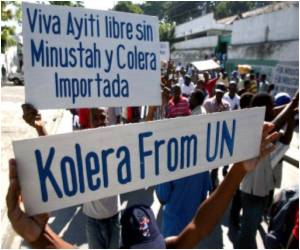Cholera is exactly the kind of disease you worry about after a catastrophic natural disaster and currently the Republic of Haiti is facing its first outbreak of cholera in a hundred years. The earthquake hit on 12 January, 2010 killing 316,000 people and leaving one million homeless 1. In a statement given to the CBC News a year after the devastating event, Prime Minister Jean-Max Bellerive believes “about 800,000 of them still live in make shift tent cities” 2. Tent cities in Haiti, mixed with poor living conditions and malnutrition become a breeding ground for the epidemic. A statement given by the AFP regarding the epidemic claimed that “the death toll from Haiti’s cholera epidemic is 4,030 and the Haitian Ministry said Thursday the number of cholera cases totaled 209,034 as of 24 January, 2011”3. These numbers are subjected to daily fluctuations, increasing and decreasing slightly with each story as they attempt to provide the masses with the most up-to-date information regarding this sensitive matter. Furthermore, one thing becomes readily apparently to the informed media reader—that the major media outlets do a fantastic job at berating the masses with information centered on devastation. Several of the major media outlets, BBC News, CBS News and the NY Times to a name a few, have all address the rather crucial issue of origin. What has shockingly been declared in all articles is that a UN contingent from Nepal is accountable. The CBS News article reports that “the back of the base smelled like a toilet had exploded. Reeking, dark liquid flowed out of a broken pipe, toward the river…" 4. That statement from the CBS News article firmly lays the blame solely on the careless sanitation practices of the 454 Nepalese UN peacekeepers stationed on the Artibonite River.
But I am going to turn my attention to the article published by the NY Times on 17 November, 2010, roughly a month after the epidemic first reared its ugly head. The title reads “Officials in Haiti Defend Focus on Cholera Outbreak, Not Its Origins”. Furthermore, the author, Randal C. Archibold declares that “medical authorizes in Haiti defend their decision Tuesday not to focus on finding the origins of a cholera outbreak that has killed more than 1,000 people…” 5. Something just does not sit right with me about that statement, where is the justice for the Haitians that remain suffering from the disease, or the people that have lost members of their family? Is it possible that this rather crucial issue is being overlooked by the NY Times article because it is the United Nations that is to blame. I believe that it would be a rather substantial blow to the credibility of the powerhouse of an organization that includes such agencies as WFO, WFP and UNICEF, and maybe the NY Times does not wish to be responsible for delivering that blow, so instead Archibold decides to overlook the truth in his article. Reading further on in the article, Archibold then proclaims that “a spokesman for the United Nations force said the protestors were using the escalating cholera epidemic as an excuse to push the troops out and destabilize the country before the November 28 presidential elections” 6. Therefore, he now shifts the negative focus onto the people of Haiti claiming that the Haitians were using the cholera epidemic as a means to manipulate the presidential election. Obviously, the United Nations is a massive organization with huge influence and it’s possible that Archibold and the NY Times did not wish to be a media outlet that jeopardizes the credibility of the United Nations. Furthermore, as horrible as it is to believe, suffering and devastation appear to be the more popular themes in media as opposed to success and progress in times of devastation. A possible theory to this statement is that the avid media reader, to some extent, sees a part of themselves reflected in the suffering of people and this undeniably invokes a sense of sympathy and with that sense of sympathy comes an urge to help. Furthermore, with this invocation of sympathy people are more compelled to donate money. So it is possible if the masses become more informed that the UN is to blame for the cholera epidemic, people will become less and less inclined to support the organization and donate money and maybe the NY Times article overlook the rather crucial issue to keep this from happening.

No comments:
Post a Comment